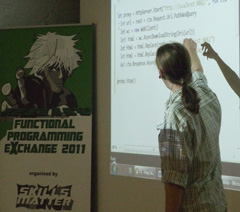F# courses and talks (Autumn 2011)

The end of the summer holiday season is getting closer. Luckily, I was in Prague last week so I actually noticed there was summer this year!
After a few quiet months, the autumn is going to be quite busy. Microsoft's //build/ conference will reveal the future of software development for Windows, but great things are going on in the F# world too. Don Syme is going to talk about F# Information Rich Programming at Progressive F# Tutorials in November, which should reveal more about F# 3.0 and type providers!
I have quite a few speaking engagements planned already, so if you want to learn about functional programming in .NET (and become a better C# programmer) or about F# and asynchronous programming, here are a few events that you may be interested in...
Published: Friday, 26 August 2011, 3:04 AM
Tags:
functional, links, presentations
Read the complete article
Programming with F# asynchronous sequences

In F#, we can represent asynchronous operations that do not block threads and eventually
return a value of type 'T using asynchronous workflows Async<'T>.
Asynchronous workflows can be easily constructed using the computation expression syntax
async { ... } and there are also a few combinators that express more advanced
composition (such as parallel composition or fork-join parallelism).
Sometimes, we need to use asynchronous operations that return more than just one value. For example, when downloading data from the internet, we would like to create an asynchronous sequence that returns the data in chunks as they become available.
One way to represent asynchronous operations that produce multiple values is to use
the IObservable<'T> type from .NET. This isn't always the best option
though. Observables implement push-based model, which means that chunks of data are
generated as quickly as possible (until all chunks are emitted). What if we wanted to take
the chunks one-by-one after the previous chunk is processed?
In this article, I describe asynchronous sequences. An asynchronous sequence is a simple, yet very powerful concept based on asynchronous workflows. It follows the same core model: results are generated on demand and asynchronously. Unlike asynchronous workflows, asynchronous sequences can be called (on demand) to generate multiple values until the end of the sequence is reached.
I first discussed asynchronous sequences with Don Syme, Dmitry Lomov and Brian McNamara in an email thread a long time ago. Thanks to Don for enthusiasm about the concept and for the first implementation of some of the combinators!
Published: Thursday, 11 August 2011, 11:30 PM
Tags:
functional, asynchronous, f#, research
Read the complete article
Real-World F# Articles on MSDN

More than a year ago, Mike Stephens from Manning (who was also behind my Real-World Functional Programming book) asked me if I'd be interested in collaborating on a project for MSDN. The idea was to collaborate with Microsoft on creating some additional content for the official F# Documentation.
A few days ago, the new content appeared on MSDN, so I finally have an excuse for the recent lack of blogging! Although the content contains a large number of new articles that are not based on my book, you can find it in the MSDN section named after my book, right under Visual F#. If you can't wait to check it out, here are all the links:
- The Real-World Functional Programming section on MSDN.
- The source code for individual chapters is available on MSDN Code Gallery.
- I also published annotated TOC with source code links on my functional programming web site.
While working on the articles, I also wrote about a few topics that we didn't use in the final version. You'll see them on my blog in the next few days, as soon as I edit them into a blog post form. Continue reading for more information about individual chapters.
Published: Wednesday, 10 August 2011, 4:38 AM
Tags:
functional, web, asynchronous, parallel, links, f#, c#
Read the complete article